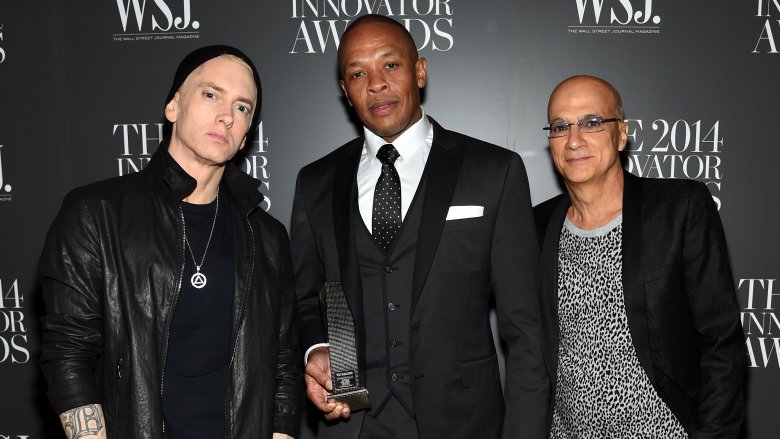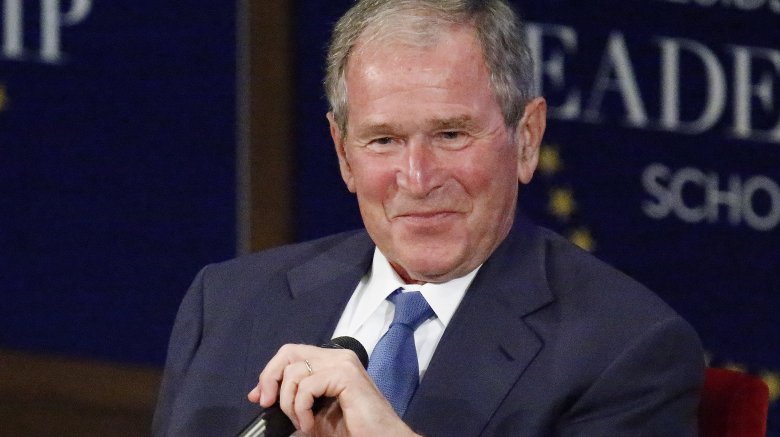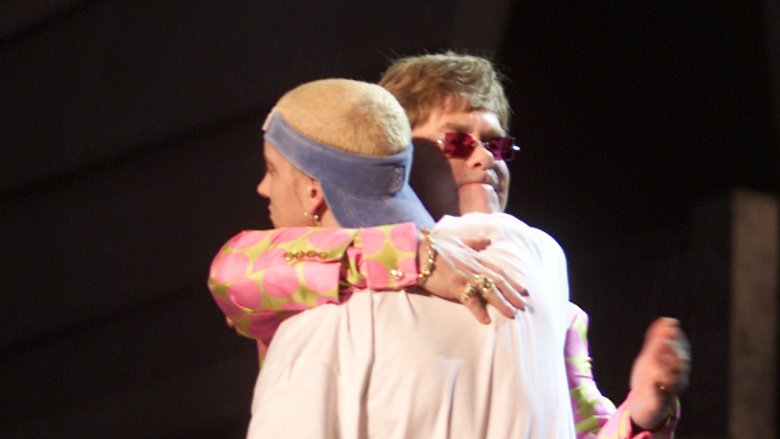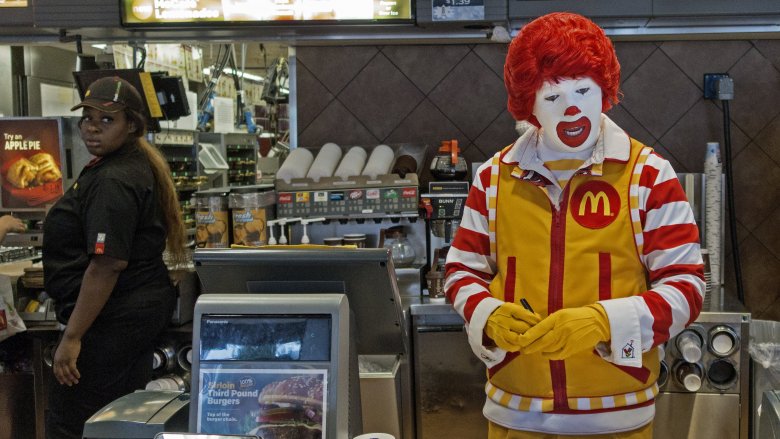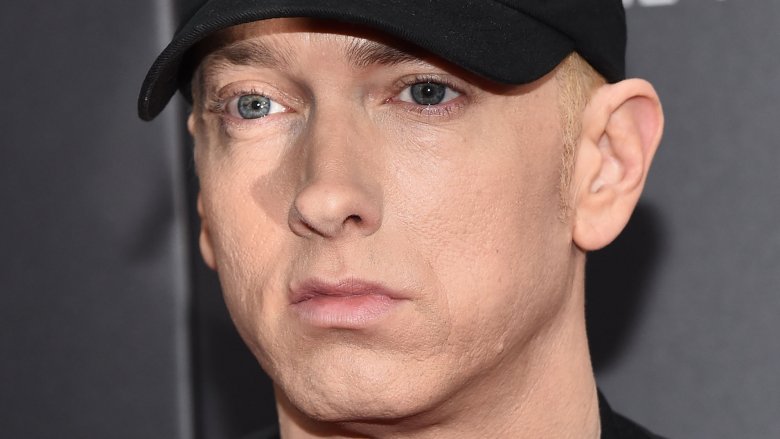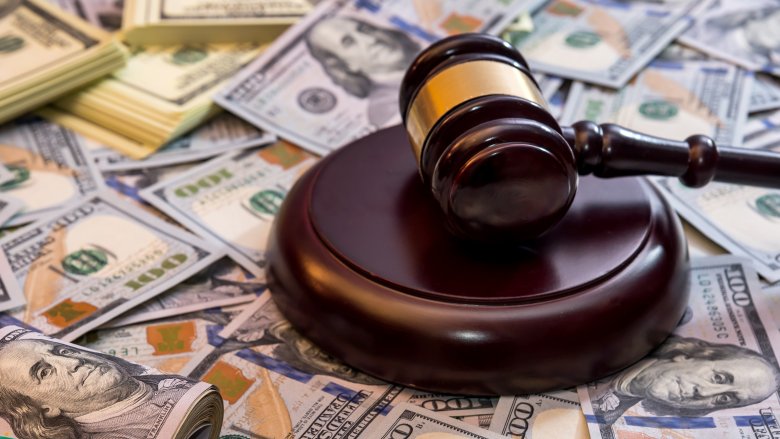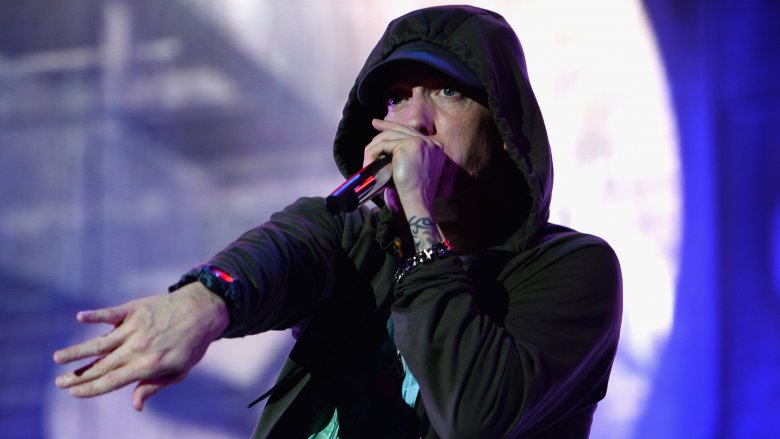Eminem's Insane Real-Life Story
Eminem: a melodious name that rolls off the tongue (and maybe melts on it, too!). A name associated with acts of depravity, highly offensive language, and enough gruesome descriptions of felony-worthy behavior to warrant a couple life sentences.
Eminem is the stage name of Marshall Mathers, also known as his constructed alter ego "Slim Shady." He's one of the most famous and contentious rappers of a generation, consistently breaking boundaries with his volatile rhymes that often reflect his personal and professional life. Here's the insane real-life story of Marshall Mathers.
He came from humble roots
Eminem was born as Marshall Mathers, the blue-eyed child of Marshall Bruce Mathers Jr. and Debbie Nelson Mathers-Briggs. Marshall's father took off 18 months after his birth, leaving 15-year-old Debbie to care for Marshall and later his younger brother Nathan. Marshall's childhood involved moving between multiple public housing systems in Kansas City and Detroit. Frequently "the new kid" and often one of the only white ones, Marshall started inhabiting an outsider's stance at an early age, often resulting in his being bullied. Meanwhile, home proved just as rocky. His mother exhibited signs of mental illness, so the responsibility for caring for his younger brother fell on Marshall's shoulders.
Perhaps understandably, Marshall didn't like school; he flunked out of the ninth grade three times before calling it quits. But he always loved English — specifically words. In an interview with 60 Minutes, he copped to enjoying reading the dictionary and demonstrated his mastery of the slant rhyme by freestyling words that rhyme with the "orange." With this keen interest in the English language, he moved into writing lyrics for rap battles in the underground music scene.
He was living in a trailer when he became a rap star
After dropping out of school, Marshall began to regularly alternate between working, writing, and performing. His white skin in a predominantly black arena caused people to initially reject him, only to be won over once he started rapping. Meanwhile, he had a baby with his high-school girlfriend, Kim. The new family inhabited crack-riddled neighborhoods: in a Rolling Stone interview, Kim recounted going through four TVs and five VCRs in two years, and Eminem recalled a crackhead who broke into their house just to make a peanut butter and jelly sandwich.
Eminem's career grew, but it wasn't enough to pay the bills. He was living in a trailer when his EP "Slim Shady" landed in the lap of Dr. Dre and Jimmy Iovine (both pictured above) of Interscope Records, who immediately tracked Eminem down and helped catapult him to fame.
The movie 8 Mile is semi-autobiographical and won an Oscar
Anyone who saw 8 Mile may acknowledge that while Eminem isn't the greatest actor, he's still a great artist: his song "Lose Yourself" won an Oscar for best original song, while acting as a vehicle for exploring the subject matter of 8 Mile. The film's plot pulled heavily from Eminem's own life: A young Detroit rapper attempts to battle his way into the music world while also combating his harsh neighborhood. "Lose Yourself" plays (non-diegetically) to portray Rabbit struggling to write lyrics worthy of a throwdown. With a tight rhythmic guitar beat guiding the vocals, the song centers on a narrator who is intensely focused on succeeding in the moment of performance, while lamenting the narrator's daily struggles. ("Can't get by with my 9 to 5 / And I can't provide the right type of life for my family," raps a morose Eminem.)
The song is so good, that with any luck an alternate dimension contains a ledger that records every time somebody played "Lose Yourself" before a major life event: a sporting event, stepping on a plane, walking down the aisle, etc. ("You only get one shot, do not miss your chance to blow" before math tests, anyone?)
He's been investigated by the Secret Service
Eminem's lyrics frequently push boundaries: This is the guy who raps about suicidal mushroom trips and forced relations with his mother, after all. But his most infamous example of crossing the line came in 2003, when a bootleg version of his song "We As Americans" surfaced with the following lyrics:
"F**k money / I don't rap for dead presidents / I'd rather see the president dead / It's never been said, but I set precedents."
Note that "dead presidents" is slang for dollar bills (Jefferson, Benjamin, Lincoln, etc.), so that line pans out. But (working theory), if you're Eminem and have one innocuous lyric, it's your artistic duty to follow up with something provocative, outrageous, or offensive. Saying that he'd "rather see the president dead" set off a whirlwind of gasps, chat-room rumors, and reports the Secret Service was looking into the song, as a standard response to investigate any possible threats against the president.
Perhaps because the song didn't specify the president of the United States or mention Bush by name, the Secret Service never took any real action against Eminem. Subsequent releases of the song, however, did censor out the word "dead." And Eminem went on to speak out against Bush's actions in his song "Mosh," albeit in more articulate — and less violent — language.
Elton John is his BFF
Homophobia and its constituents — derogatory slurs, names, and jokes — make their way into many of Eminem's songs. So it may surprise you to learn that Elton John is a huge fan of Eminem's work, a lifelong friend, and a defendant when people accuse him of homophobia. During a discussion recorded in Interview Magazine in 2017, John told Eminem: "When that s**t was thrown at you — about you being homophobic — I just thought, 'I'm not standing for this. It's nonsense.' I had to stand up and defend you. That Grammy performance was the start of a lovely friendship and I'm grateful for that."
The Grammy performance he's referencing is the duo's 2001 collaboration on "Stan," a song that describes a crazed fan who eventually commits a double homicide after not hearing back from his musical idol. (While the performance received mixed reviews, the song has stood the test of time: In 2017, the Oxford English Dictionary included the word "stan" in its lexicon to denote "an overzealous or obsessive fan of a particular celebrity.")
Elton John's and Eminem's friendship demonstrates the separation between Marshall Mathers and the personas he takes on in his songs. It's also worth noting that these songs don't take kindly to just about anyone: straight or gay, black or white; marginalized or not. In that regard, his lyrics are agnostic — there's no one or no subject that Eminem won't take on.
He had a fat phase
Pill-popping musicians and unnatural weight gain have a certain legacy in music. Elvis started the trend; at one point, John Lennon continued it. Eminem picked up the baton when his substance addictions included massive intakes of food and pills.
At his worst, Eminem consumed 60 Valium and 30 Vicodin a day, plus multiple Ambien. Meanwhile, he ate regularly at fast food joints like Taco Bell and McDonald's, gaining 80 pounds and a relationship with the staff as a regular. One day at McDonald's, he overheard a conversation between two people debating whether or not it was actually him because of the extra weight. The fact that his own fans couldn't recognize him acted as wake-up call to Eminem, but it wasn't the one that would save his life.
He's been sober nine years
At his worst, Eminem was staying in bed all day and popping pills just to function. Extensive drug use wiped out many of his memories, which he attributes to Ambien specifically. Whatever the case, he hit rock bottom when trying to get out of bed one day and falling to the ground unconscious. Later, doctors told him he'd consumed the equivalent of four bags of heroin (via Rolling Stone).
It took that hospital trip, a relapse, and a stint in rehab to set him sober, with help from Elton John, who became his sponsor. Eminem told Rolling Stone how John was able to walk him through sobriety by describing not just the various known stages, but smaller moments as well: how colors and sensations would intensify, how he would be able to notice small details without drugs.
Ever the artist, Eminem channeled his struggles into the album "Recovery," which revolves around the theme of — you guessed it — getting clean.
Despite being a famous kid of a rap star, Hailie is very normal
Beyond all the obscenities and constructed stage identities, the one thread that runs authentic through all of Eminem's music is his love for his daughter Hailie.
She's been the subject of her father's songs from her youngest years. Frequently, she's depicted as an anchor in the storm, the primary subject of her father's love that manages to keep him sane in an otherwise crazed world. Sometimes, he uses her to demonstrate a man torn and conflicted: either between being able provide for his family while pursuing his dreams, or loving his daughter while wanting to kill her mother. (You know, normal family stuff.) When Eminem collapsed from a drug overdose, he described the hardest part as missing out on Christmas with his kids.
In that sense, Hailie's a very public persona who has never stepped squarely into the spotlight. But despite the fame, she grew up apparently normal. Check out her 20ish Instagram posts, and you'll see her hanging out with friends, showing off outfits, and looking like any normal, well-adjusted young 'un. Congrats!
He's had as many courtroom battles as rap ones
Eminem's no stranger to the courtroom. In the first 13 years of his fame, he encountered at least one major lawsuit per year, possibly spending several million dollars in legal costs.
Several lawsuits came from immediate friends or family members. His mother sued him for $10 million for defamation of character based on his descriptions of her in interviews and his music. (She eventually won just $1,600 in damages.) His aunt and uncle also sued him after he bought them a house and wanted to keep it in his name. Kim also sued him for defamation, as did a bully from high school. None of these lawsuits panned out the way the prosecutors intended.
Other issues included a concealed weapon charge and an assault charge. The first came when he pulled an unloaded gun on someone outside a car audio store in Michigan. Eminem was arrested then released, only to be swooped back up the next day when he saw his wife smooching a club bouncer and got violent. Eminem pleaded guilty to both charges and was given two years' probation.
Finally, Eminem took out the big guns when going against Apple twice, for different incidents; they reached quiet settlements out of court. He'll have material for years!
Besides the obvious financial burden, Eminem's enemies created considerable mental distress for the rap star: he started wearing a bulletproof vest just to frequent his recording studio.
His divisive music also brings people together
Expressing anger at authority is Eminem's forte, so it was no surprise when he dropped "Storm," a 4.5-minute bash on President Trump while his buddies stand in the background. The video premiered at the BET Hip Hop awards and got a lot of support from other celebs, including Ellen DeGeneres and Snoop Dogg.
The aggressive quality of his music isolates many while resonating with others. He knows how to lay low and stay prolific at the same time. He might go years without releasing an album, but when he does release one, it rides a line between the topical and the personal.
Perhaps the outsider stance he picked up as a child allows him to maintain a completely unique voice in a field filled with cliches. Either way, Shady is back, and it looks like he's here to stay.

